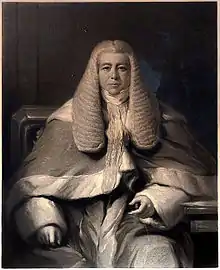Francis Blackburne
Francis Blackburne PC (Ire) KS (11 November 1782 – 17 September 1867) was an Irish judge and eventually became Lord Chancellor of Ireland.
Francis Blackburne | |
|---|---|
 | |
| Lord Chancellor of Ireland | |
| In office 1866–1867 | |
| Preceded by | Maziere Brady |
| Succeeded by | Abraham Brewster |
| Personal details | |
| Born | 11 November 1782 Footstown Great |
| Died | 17 September 1867 (aged 84) Rathfarnham Castle |
| Alma mater | Trinity College Dublin |
Background
Born at Great Footston in County Meath, he was the son of Richard Blackburne of Great Footstown and nephew of Anthony Blackburne, Deputy Lieutenant and High Sheriff of Meath. His mother, Elizabeth, was the daughter of Francis Hopkins (1724-1778) of Gillstown, Co. Meath and Darvistown, Co. Westmeath,[1] a first cousin of Sir Francis Hopkins M.P., 1st Baronet of Athboy, Co. Meath; they were two of the great-grandsons of Ezekiel Hopkins, Bishop of Derry during the Siege of Derry, by his second wife, Araminta, daughter of John Robartes, 1st Earl of Radnor.
Blackburne was educated in Dublin at the school of Rev. William White before entering Trinity College Dublin in 1798, later winning a scholarship, gold medal (1803) and other distinctions.[2] He finally graduated in 1806 (M.A.) and was a member of the Old Historical Society.
Judicial career
He was called to the Irish Bar in 1805 and practised with great success on the home circuit. Blackburne was nominated a King's Counsel in 1822 and administered the Insurrection Act in Limerick for two years, effectually restoring order in the district. In 1826 he became the King's Third Serjeant-at-law and in 1830 was advanced to the Second Serjeant.[2] A year later, he was appointed Attorney-General for Ireland in the Whig administration of Earl Grey 'though known to be a tory ... with a view to the Irish administration having a broad political base'[3] and on this occasion was sworn of the Privy Council of Ireland.[2] He held the post as Attorney-General until 1834; he was readmitted in 1841 and after serving for a year, became Master of the Rolls in Ireland.[2] As Attorney General he clashed with Daniel O'Connell when he insisted, against O'Connell's wishes, on the appointment of Abraham Brewster as Law Adviser to the Lord Lieutenant of Ireland (in effect, a deputy to Brewster himself). Blackburne's statement that he "would not tolerate a refusal to ratify the appointment", is an indication of the influence which could then be wielded by a strong Attorney General. In 1845, he was chosen Chief Justice of the Court of Queen's Bench.[2] Blackburne was appointed Lord Chancellor of Ireland in February 1852, but was replaced in October.[2] After a break of four years, he became a Lord Justice of Appeal.[2] In 1858 'he was invited by Lord Derby again to become lord chancellor, but he declined on account of his advanced age and failing health. He changed his mind, however, and decided to accept Derby's offer but was told that the position had been offered to and accepted by Joseph Napier.'[3] He was bitterly disappointed, referring to the decision as "a harsh and cruel blow". In 1866, he began a second term as Lord Chancellor, which ended with his death in the next year.
Blackburne prosecuted Daniel O'Connell and presided at the trial of William Smith O'Brien. From 1851, he was vice-chancellor of the University of Dublin.[4]
A devoted member of the Church of Ireland, he opposed any measure hostile to its interests, arguing that an attack on the Church. was an attack on the Union itself.
Family
In 1809, he married Jane, daughter of William Martley of Ballyfallen, Co. Meath and his wife Elizabeth, daughter of Richard Rothwell of Berford, Co. Meath. They were the parents of three sons and three daughters. Blackburne bought Rathfarnham Castle in 1852, where his family continued to reside for three generations.
Notes
- Blackburne, Edward (1874). Life of the Right Hon. Francis Blackburne: Late Lord Chancellor of Ireland. Macmillan and Co.
- Dod, Robert P. (1860). The Peerage, Baronetage and Knightage of Great Britain and Ireland. London: Whitaker and Co. p. 119.
- Smith, G. B.; Hogan, Daire. "Blackburne, Francis (1782?–1867)". Oxford Dictionary of National Biography (online ed.). Oxford University Press. doi:10.1093/ref:odnb/2514. (Subscription or UK public library membership required.)
- Smith 1886.
References
- Webb, Alfred (1878). . A Compendium of Irish Biography. Dublin: M. H. Gill & son – via Wikisource.
- . Encyclopedia Americana. 1920.
- Smith, George Barnett (1886). . Dictionary of National Biography. 5.CS1 maint: ref=harv (link)
- Chisholm, Hugh, ed. (1911). . Encyclopædia Britannica. 4 (11th ed.). Cambridge University Press.
| Legal offices | ||
|---|---|---|
| Preceded by Edward Pennefather |
Attorney-General for Ireland 1831–1834 |
Vacant Title next held by Louis Perrin |
| Preceded by David Richard Pigot |
Attorney-General for Ireland 1841–1842 |
Succeeded by Thomas Cusack-Smith |
| Preceded by Michael O'Loghlen |
Master of the Rolls in Ireland 1842–1845 |
Succeeded by Thomas Cusack-Smith |
| Preceded by Edward Pennefather |
Lord Chief Justice of the Queen's Bench for Ireland 1846–1852 |
Succeeded by Thomas Langlois Lefroy |
| Political offices | ||
| Preceded by Maziere Brady |
Lord Chancellor of Ireland February – October 1852 |
Succeeded by Maziere Brady |
| Preceded by Maziere Brady |
Lord Chancellor of Ireland 1866–1867 |
Succeeded by Abraham Brewster |